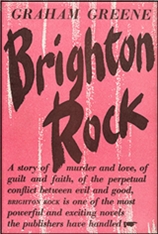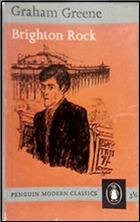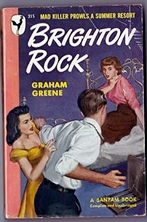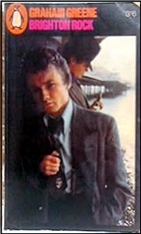Fri 24 Nov 2023
GRAHAM GREENE – Brighton Rock. William Heinemann Ltd,. UK, hardcover, 1938. Viking Press, US, hardcover, 1938. Reprinted numerous times. Film: Produced and directed by John and Roy Boulting, UK, 1948. It starred Richard Attenborough as Pinkie, with Carol Marsh as Rose. Released in the US as Young Scarface.
So I’ve been a bit of a jingoist when it comes to hardboiled lit. My default take has been that it was originally an American phenomenon and that British hardboiled was generally pastiche (save for later writers like Derek Raymond and Ted Lewis, for example). I’ll admit it. I was wrong. I wasn’t necessarily wrong about Peter Cheyney and James Hadley Chase. But I was wrong for thinking that Cheyney and Chase were representative of British hardboiled.

In America anyway, hardboiled lit was clearly part of the zeitgeist in the 1920’s-30’s. The amount of amazing stuff from a host of different writers is simply astounding. And the more I read stuff from the era, the more convinced I am that the hardboiled era of lit in America is not simply a matter of a couple of exceptional artists that randomly appeared (e.g. Hemingway and Hammett). Rather, there was really a hardboiled aesthetic movement of some kind.
(See, for example, Geoffrey O’Brien’s Hardboiled Checklist, link hopefully to follow. UPDATE: See comments.)
Not a conscious or organized movement (except perhaps as a result of Cap Shaw’s admonitions to would be Black Mask authors to pattern their stories on Hammett); but rather simply a matter of a confluence of factors enabling a market for underworld vernacular and blue collar speech patterns to make their way into popular literature. The combination of cheap paper production capacities (e.g. ‘pulp), literacy of the masses, leisure time (whether due to limited working hours or high unemployment), and other factors seem to have generated a perfect storm enabling a commercial space for hardboiled literature.
In any case, contrary to my initial instincts, this does not seem to just be an American phenomenon. See, for example, this terrific list of British hardboiled lit:
https://www.deadgoodbooks.co.uk/top-ten-british-noir-titles-yesteryear/

So, anyway, I recently read Brighton Rock. And I’m here to tell you, the book is a freaking masterpiece of hardboiled lit. It is pretty much perfect in every way: expertly plotted with a perfect ending, credible, earthy underworld prose, crime, murder, detection and rough-hewn justice. It was messy, dirty, unshaven and soused, and it didn’t care who knew it. It was everything the well-dressed hardboiled novel ought to be.
There’s a gang war happening in Brighton. Kite’s gang has the rough and tumble street kids shaking down the local businesses offering ‘protection’ for a monthly fee. Take it or be damned. The other gang is slicker, run more like the mob by a ‘Mr. Colleoni’. He handles the slots and table gambling.
But capitalism must always grow. Burroughs says: ‘When you stop growing you start dying’. So Kite tries to take the slots and Colleoni the shakedowns.
Kite loses and is killed. And ‘Pinkie’, a 17 year old punk with the morality of a crushed stone, takes over Kite’s gang.
First piece of business is revenge for Kite. Pinkie sets his eyes on Kite’s finger man — a pretty low level member of the Colleoni mob. Name of Hale.
“Hale knew they meant to murder him before he had been in Brighton three hours.â€

So Hale tries to hide from Pinkie and the rest of Kite’s crew. He figures if he can pick up a woman and stay with her that he’ll be safe. So he does. Her name is Ida Arnold. She’s a husky, maternal, buxom bosomed broad with a deep laugh, who loves to sing and dance and drink a draught or two of bitter stout.
Hale feels safer under Ida’s large wing. I have to go to the toilet, though, she says. Oh please don’t, he begs. It’ll just be a minute, says Ida — why so clingy? Oh, it’s nothing. I’ll be right here, Hale says. Don’t be long.
And Ida’s not. She’s not long. But Hale’s not long for this world. And when Ida returns from the pot, Hale’s gone. No where to be found. Til the morning.
So Hale’s washed up ashore. And Ida feels really bad about it. She feels a bit responsible for Hale—and she resolves to find his killer.
The cops are corrupt — and Colleoni doesn’t want Hale’s death classified as a murder, lest his reputation take a hit. So the cops rule it a natural death.
Ida ain’t satisfied. So she becomes the de facto sleuth.
She haunts Pinkie and his gang. She won’t give up until she finds out what happened and brings Hale some justice.

Not to give anything away — but Ida isn’t somebody to bet against. She’s a terrific creation, all gumption and strength. A whirlwind of wine, bosom and song. Pinkie in her sights.
There’s also some interesting morality in the background, as is Greene’s wont, about right and wrong versus good and evil. Turns out Pinkie was raised Catholic. And as soon as he’s committed a mortal sin, he figures he’s damned anyway so nothing matters. Once he commits his first mortal sin, he’s free to commit as many more as he likes. As long as he seeks absolution ‘between the stirrup and the ground’, he’ll be saved.
Ida, on the other hand, doesn’t believe in good or evil. She only believes in right and wrong. She thinks that killing Hale was wrong, and she’s there to right it. Ida won’t give up until she does. Nor will you.
November 24th, 2023 at 11:23 pm
There are two fine film adaptations of this, the original with Richard Attenborough as Pinkie, and a more recent version. Both are good though the original is the one to see if possible.
I hold this is Greene’s best book though some argue for A BURNT OUT CASE and POWER AND THE GLORY, for me it is too narrow a fence to sit on to make a call between them. His “Entertainment” GUN FOR SALE (THIS GUN FOR HIRE) is also hard boiled though not quite in a league with this.
E. B. Quinn was another British writer whose James Strange books were very much in the vein of Raymond Chandler before Chandler’s first novel was published.
The pulpier British writers in the Cheyney and Chase style Like David Hume and his Mick Cardby, John Bentley and Dick Marlow, and Gerard Fairlie and Johnny McCall owe as much to Sapper, Charteris, and Edgar Wallace as the American tradition.
Gerald Kersh is another good choice for the more literary British school with books like NIGHT AND THE CITY and PRELUDE TO A CERTAIN MIDNIGHT.
November 25th, 2023 at 6:58 am
“She… loves to drink a draught or two of bitter stout.”
Not quite. They are different drinks. Stout on its own – especially milk stout – was considered a woman’s drink.
“And as soon as he’s committed a mortal sin, he figures he’s damned anyway so nothing matters. Once he commits his first mortal sin, he’s free to commit as many more as he likes.”
A precursor of noir – and especially Brighton Rock – is Thomas Hogg’s “The Private Memoirs and Confessions of a Justified Sinner: Written by Himself: With a detail of curious traditionary facts and other evidence by the editor”. Hogg was a Scottish Calvinist, so there’s lots of heavy-duty theology too.
“Geoffrey O’Brien’s Hardboiled Checklist, link hopefully to follow.”… the suspense is killing me!
November 25th, 2023 at 10:54 am
Hardboiled Checklist: https://www.miskatonic.org/rara-avis/biblio/checklist.html
November 25th, 2023 at 2:19 pm
Or, to save you a click on the link:
1929
Dashiell Hammett: Red Harvest, The Dain Curse
W.R. Burnett: Little Caesar
Carroll John Daly: The Hidden Hand
S.S. Van Dine: The Bishop Murder Case
Ellery Queen: The Roman Hat Mystery
1930
Dashiell Hammett: The Maltese Falcon
Raoul Whitfield: Green Ice
W.R. Burnett: Iron Man
Carroll John Daly: The Tag Murders
John Dos Passos: The 42nd Parallel
Mary Roberts Rinehart: The Door
James M. Cain: Our Government
1931
Dashiell Hammett: The Glass Key
William Faulkner: Sanctuary
Raoul Whitfield: Death in a Bowl, Danger Zone
Carroll John Daly: Tainted Power, The Third Murderer
1932
Paul Cain: Fast One
Erskine Caldwell: Tobacco Road
William Faulkner: Light in August
James T. Farrell: Young Lonigan
John Dos Passos: 1919
Graham Greene: Stamboul Train (a.k.a Orient Express)
1933:
Nathanael West: Miss Lonelyhearts
Erskine Caldwell: God’s Little Acre
James T. Farrell: Gas House McGinty
Erle Stanley Gardner: The Case of the Velvet Claw
Carroll John Daly: The Amateur Murderer, Murder Won’t Wait
W.R. Burnett: Dark Hazard
S.S. Van Dine: The Kennel Murder Case
1934
James M. Cain: The Postman Always Rings Twice
Dashiell Hammett: The Thin Man
John O’Hara: Appointment in Samarra
James T. Farrell: The Young Manhood of Studs Lonigan
Rex Stout: Fer-de-Lance
S.S. Van Dine: The Casino Murder Case
1935
Horace McCoy: They Shoot Horses, Don’t They?
William Faulkner: Pylon
Jonathan Latimer: Murder in the Madhouse, Headed for a Hearse
John O’Hara: Butterfield 8
Erskine Caldwell: Journeyman
James T. Farrell: Judgement Day
John Steinbeck: Tortilla Flat
Carroll John Daly: Murder from the East
1936
James M. Cain: Double Indemnity
Jonathan Latimer: The Lady in the Morgue
James T. Farrell: A World I Never Made
Jay Dratler: Manhattan Side Street
Richard Sale: Not Too Narrow, Not Too Deep
Carroll John Daly: Mr. Strang, The Mystery of the Smoking Gun
Rex Stout: The Red Box
John Dos Passos: The Big Money
Graham Greene: A Gun for Sale (a.k.a. This Gun for Hire
1937
James M. Cain: Serenade
Ernest Heminway: To Have and Have Not
Horace McCoy: No Pockets in a Shroud
Carroll John Daly: Emperor of Evil
John Steinbeck: Of Mice and Men
1938
Horace McCoy: I Should Have Stayed Home
James M. Cain: Career in C Major, The Root of His Evil (published 1951)
John O’Hara: Hope of Heaven
Jonathan Latimer: The Dead Don’t Care
Richard Hallas: You Play the Black and the Red Comes Up
James Hadley Chase: No Orchids for Miss Blandish
Dorothy Baker: Young Man with a Horn
Eric Ambler: Epitaph for a Spy
Gerald Kersh: Night and the City
Nicholas Blake: The Beast Must Die
1939
Raymond Chandler: The Big Sleep
William Faulkner: The Wild Palms
Nathanael West: The Day of the Locust
Jonathan Latimer: Red Gardenias
Kenneth Fearing: The Hospital
David Goodis: Retreat from Oblivion
Eric Ambler: A Coffin for Dimitrios, Cause for Alarm
Graham Greene: Confidential Agent
Geoffrey Household: Rogue Male
John Steinbeck: The Grapes of Wrath
1940
Raymond Chandler: Farewell, My Lovely
Cornell Woolrich: The Bride Wore Black
James M. Cain: The Embezzler
Dorothy B. Hughes: The So Blue Marble, The Cross-Eyed Bear Murders
W.R. Burnett: High Sierra
Jonathan Latimer: Dark Memory
John O’Hara: Pal Joey
Jay Dratler: Ducks in Thunder
James Ross: They Don’t Dance Much
Percival Wilde: Inquest
Frank Gruber: The French Key, The Laughing Fox
Richard Sale: Destination Unknown
Eric Ambler: Journey Into Fear
Raymond Postagte: Verdict of Twelve
Ernest Hemingway: For Whom the Bell Tolls
1941
Kenneth Fearing: Dagger of the Mind
James M. Cain: Mildred Pierce
Cornell Woolrich: The Black Curtain
Jonathan Latimer: The Fifth Grave (a.k.a. Solomon’s Vineyard)
Maritta Wolf: Whistle Stop
Dorothy B. Hughes: The Bamboo Blonde
Nelson Algren: Never Come Morning
Budd Schulberg: What Makes Sammy Run?
Frank Gruber: Simon Lash – Private Detective, The Navy Colt, The Talking Clock, The Hungry Dog
Craig Rice: Trial By Fury
1942
Raymond Chandler: The High Window
Cornell Woolrich: Phantom Lady, Black Alibi
James M. Cain: Love’s Lonely Counterfeit
Richard Sale: Lazarus #7, Passing Strange
Dorothy B. Hughes: The Fallen Sparrow
Jim Thompson: Now and On Earth
Kenneth Fearing: Clark Gifford’s Body
James Gunn: Deadlier Than the Male
W.R. Burnett: The Quick Brown Fox
Frank Gruber: The Mighty Blockhead, The Gift Horse, The Buffalo Box
1943
Raymond Chandler: The Lady in the Lake
Cornell Woolrich: The Black Angel
Vera Caspary: Laura
Dorothy B. Hughes: The Blackbirder
Ira Wolfert: Tucker’s People
Margaret Millar: Wall of Eyes
James Hadley Chase: Twelve Chinks and a Woman
Graham Greene: The Ministry of Fear
1944
Cornell Woolrich: The Black Path of Fear, Deadline at Dawn
Ross Macdonald: The Dark Tunnel
Dorothy B. Hughes: The Delicate Ape, Johnnie
Erskine Caldwell: Tragic Ground
W.R. Burnett: Nobody Lives Forever
1945
Cornell Woolrich: Night Has a Thousand Eyes
Dorothy B. Hughes: Dread Journey
1946
Kenneth Fearing: The Big Clock
David Goodis: Dark Passage
Dorothy B. Hughes: Ride the Pink Horse
Paul Cain: Seven Slayers
John Evans: Halo in Blood
Ross Macdonald: Trouble Follows Me
Richard Sale: Benefit Performance
William Lindsay Gresham: Nightmare Alley
James M. Cain: Past All Dishonor
Chester Himes: If He Hollers Let Him Go
Roy Huggins: The Double Take
Jim Thompson: Heed the Thunder
Wade Miller: Deadly Weapon
1947
David Goodis: Nightfall (a.k.a. The Dark Chase), Behold This Woman
Ross Macdonald: Blue City
James M. Cain: The Butterfly, Sinful Woman
Mickey Spillane: I, the Jury
Cornell Woolrich: Waltz Into Darkness
Jay Dratler: The Pitfall
Dorothy B. Hughes: In a Lonely Place
Eleazar Lipsky: Kiss of Death
Irving Shulman: The Amboy Dukes
Roy Huggins: Too Late for Tears
Willard Motley: Knock on Any Door
Nelson Algren: The Neon Wilderness
John Evans: If You Have Tears
Howard Hunt: Stranger in Town
John Steinbeck: The Wayward Bus
1948
Horace McCoy: Kiss Tomorrow Goodbye
Cornell Woolrich: Rendezvous in Black, I Married a Dead Man
James M. Cain: The Moth
Ross Macdonald: The Three Roads
John Evans: Halo for Satan
Eleazar Lipsky: Murder One
Charles O. Gorham: The Future Mister Dolan, The Gilded Hearse
Howard Hunt: Maelstrom (a.k.a. Dark Encounter)
Frank Gruber: Murder ’98, The Lock and the Key
1949
Raymond Chandler: The Little Sister
Ross Macdonald: The Moving Target
W.R. Burnett: The Asphalt Jungle
Patricia Highsmith: Strangers on a Train
Jim Thompson: Nothing More Than Murder
Dorothy B. Hughes: The Big Barbecue
John Evans: Halo in Brass
Nelson Algren: The Man with the Golden Arm
John O’Hara: A Rage to Live
Howard Hunt: Bimini Run
Roy Huggins: Lovely Lady, Pity Me
William Lindsay Gresham: Limbo Tower
Hal Ellson: Duke
Graham Greene: The Third Man
1950
Ross Macdonald: The Drowning Pool
John D. MacDonald: The Brass Cupcake
David Goodis: Of Missing Persons
James M. Cain: Jealous Woman
Mickey Spillane: My Gun is Quick, Vengeance is Mine
Cornell Woolrich: Savage Bride, Fright
Howard Hunt: The Violent Ones
Dorothy B. Hughes: The Candy Kid
Eleazar Lipsky: The People Against O’Hara
Hal Ellson: Tomboy
Richard S. Prather: The Case of the Vanishing Beauty
Budd Schulberg: The Disenchanted
1951
David Goodis: Cassidy’s Girl
Ross Macdonald: The Way Some People Die
John D. MacDonald: Murder for the Bride, Judge Me Not, Weep for Me
Cornell Woolrich: Strangler’s Serenade
Kenneth Fearing: The Loneliest Girl in the World
John O’Hara: The Farmers Hotel
Mickey Spillane: One Lonely Night, The Big Kill, The Long Wait
William P. McGivern: Shield for Murder
Richard S. Prather: Bodies in Bedlam
1952
Jim Thompson: The Killer Inside Me, Cropper’s Cabin
John D. MacDonald: The Damned
Ross Macdonald: The Ivory Grin
David Goodis: Of Tender Sin, Street of the Lost
Horace McCoy: Scalpel, Corruption City (published 1959)
William P. McGivern: The Big Heat
Mickey Spillane: Kiss Me, Deadly
Leonard Bishop: Down All Your Streets
Dorothy B. Hughes: The Davidian Report
Howard Hunt: Whisper Her Name
1953
Raymond Chandler: The Long Goodbye
John D. MacDonald: Dead Low Tide, The Neon Jungle, Cancel All Your Vows
David Goodis: The Burglar, The Moon in the Gutter, The Wounded and the Slain
Jim Thompson: The Criminal, Bad Boy, The Alcoholics, Savage Night, Recoil
Ross Macdonald: Meet Me at the Morgue
James M. Cain: Galatea
Ira Levin: A Kiss Before Dying
William P. McGivern: Margin of Terror
William Burroughs: Junkie
Ian Fleming: Casino Royale
1954
David Goodis: Black Friday, Street of No Return, The Blonde on the Street Corner
John D. MacDonald: Area of Suspicion, All These Condemned, Contrary Pleasure
Ross Macdonald: Find a Victim
Jim Thompson: The Golden Gizmo, A Hell of a Woman, The Nothing Man, Roughneck, A Swell-Looking Babe, King Blood
Evan Hunter: The Blackboard Jungle
William P. McGivern: Rogue Cop
Kenneth Fearing: The Generous Heart
John Evans: Thin Air
Richard S. Prather: Always Leave ‘Em Dying, Pattern for Panic
Ian Fleming: Live and Let Die
1955
John D. MacDonald: A Bullet for Cinderella, Cry Hard, Cry Fast
Jim Thompson: After Dark, My Sweet
Jonathan Latimer: Sinners and Shrouds
Ross Macdonald: The Name is Archer
Jay Dratler: The Judas Kiss
Chester Himes: The Primitive
Patricia Highsmith: The Talented Mr. Ripley
Margaret Millar: Beast in View
Howard Hunt: Unfaithful
Hall Ellson: Rock
Richard S. Prather: Darling, It’s Death, Everybody Had a Gun, Strip for Murder
Edward S. Aarons: Assignment Disaster
1956
John D. MacDonald: Murder in the Wind, April Evil, You Live Once
David Goodis: Down There (a.k.a. Shoot the Piano Player)
Ross Macdonald: The Barbarous Coast
Ed McBain: Cop Hater, The Mugger, The Pusher
Patricia Highsmith: The Blunderer
Cornell Woolrich: Nightmare
Nelson Algren: A Walk on the Wild Side
Maritta Wolf: The Big Nickleodeon
Wenzell Brown: The Wicked Streets
1957
John D. MacDonald: The Price of Murder, Death Trap, The Empty Trap, A Man of Affairs
David Goodis: Fire in the Flesh
Jim Thompson: The Kill-Off
Ed McBain: The Con Man
Patricia Highsmith: Deep Water
Chester Himes: For Love of Imabelle
Ian Fleming: From Russia with Love
1958
Raymond Chandler: Playback
Ross Macdonald: The Doomsters
John D. MacDonald: The Executioners, Clemmie, Soft Touch
Jim Thompson: The Getaway, Wild Town
Cornell Woolrich: Hotel Room, Violence
Ed McBain: King’s Ransom
Stanley Ellin: The Eighth Circle
Roy Huggins: 77 Sunset Strip
Robert Traver: Anatomy of a Murder
Patricia Highsmith: A Game for the Living
Jack Kerouac: The Subterraneans
Ian Fleming: Dr. No
November 25th, 2023 at 2:21 pm
I didn’t do a precise count — and in fact, no count at all — but I think the authors whose books are cited most often are:
Jim Thompson, John D. MacDonald, and David Goodis.
November 26th, 2023 at 6:57 am
Many thanks, Tony and Steve.
I was puzzled until I looked the list up and found it was for the Hardboiled Era, rather than just hardboiled books.
December 5th, 2023 at 6:50 pm
Chase remains poorly studied.